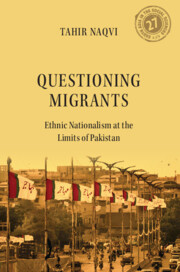Preface
Published online by Cambridge University Press: 13 November 2024
Summary
In Pakistan, the term muhajir (migrant) carries religious, political, and biographical significance, pointing to the role that mass migration has played in shaping the country's experience of decolonization. Nearly six million people crossed into Pakistan as involuntary migrants or “evacuees” shortly after independence (1947) under the protection of an official “transfer of population” accord that was launched by the newly formed federal governments of India and Pakistan in an effort to stem the outbreak of communal genocide on both sides of the partitioned province of Punjab. The archive of the anticolonial nationalist period tells us that mass migration was not envisioned in the outline of Muslim emancipation. As late as June of 1947, Muhammad Ali Jinnah, the leader and chief political strategist of the All-India Muslim League (AIML), could therefore advise his Muslim supporters to “stick to their homelands” in India and “avoid the temptation” to migrate to Pakistan (AIML June 9, 1947). Arriving against late colonial expectations, Muslim migrants entering Pakistan were referred to by the state and within public discourses as muhajireen (migrants/refugees), a term whose Islamic connotations were robustly utilized in the post-Partition context to frame the incoming population as affectees, co-nationals, and citizens-in-the-making.
Included yet distinguished from the larger body of mass migrants within Pakistan at the time of Partition were Muslims from northern and central India, who, in contrast to the majority of the muhajireen arriving in Pakistan at this time, were represented in emergent political terms as ideologically guided voluntary migrants. This section of Pakistan's mass-migrant population came to be referred to as “Muhajirs” in more durable and ethnically charged terms, a shift that is underscored by a linguistic and political transformation of muhajir from a descriptor into a proper name. The demographic upheavals associated with Partition were of such a scale that Muhajirs soon became a numerical majority in the major cities of the southern province of Sindh. The regional-, urban-, and neighborhood-level transformations resulting from this newly found “majority– minority” status were most evident in Karachi, the provincial capital and colonial port city, and the locus for this study.
- Type
- Chapter
- Information
- Questioning MigrantsEthnic Nationalism at the Limits of Pakistan, pp. xv - xviiiPublisher: Cambridge University PressPrint publication year: 2025

